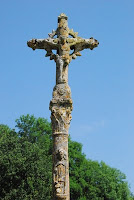 At dinner with some priests the other night, we were talking about baptisms and the interesting happenings during this rite. We had all experienced the handful of family or friends of the couple, who adamantly refuses to respond to any of the prayers. "Do you believe in God the Father?" They will glare back, arms folded, without the slightest inclination to to be moved or swayed by the sacred rites before them.
At dinner with some priests the other night, we were talking about baptisms and the interesting happenings during this rite. We had all experienced the handful of family or friends of the couple, who adamantly refuses to respond to any of the prayers. "Do you believe in God the Father?" They will glare back, arms folded, without the slightest inclination to to be moved or swayed by the sacred rites before them.
In our post-modern age religion and faith has become a very personal object. "I believe' these particular objects or precepts of God, regardless of whether they are part of the larger teaching of the Church, or any other religious body. The corporal and spiritual works of mercy are out, but smiling at a family member and wishing them a 'good day' is the basis of salvation. There is certainly a need of good and solid theology.
That need of course begins with the Theologians in Colleges and Seminaries. Father Thomas Weinandy, OFM Cap, is an executive secretary on the Bishop's Committee on Doctrine. In a 26th May address he called the role of the Theologian one of a vocation. Like any vocation there is a divine call and human response involved. Weinandy pointed out that a difficulty today is that theologians are almost antagonistic towards the theological tradition that has gone on before them, and seemingly try to disprove the pastoral teachings of the bishops.
Father Weinandy points to the fact that our faith and tradition are intimately connected. More so they can only be grasped by holy men and women. Theologians therefore need to strive for holiness, and remain in touch with the divine love of God, and our Church's faith tradition. Weinandy wants us to understand that one cannot stand outside the mysteries of our faith and speak to them, but the best conversation occurs when we are living within that mystery of faith.
Going on down the line, our religion teachers, catechists, and even parents, best convey the faith when they live as part of it. The celebration of the Eucharist, prayer, and works of charity help us remain connected to the faith that we profess. We can more easily speak and teach about the faith and teachings we profess when we live within the picture. Our spiritual bearing can and will influence others around us to contemplate faith and religion.
So come baptism Sunday, the question of belief in God will be met with seeking eyes, rather than defiance. Passing on the faith is just that. It is the teaching and understanding of the sacred scriptures and the Church. Not what I think that Church should believe in. By understanding this we are conveying all that we have seen and heard to others.








